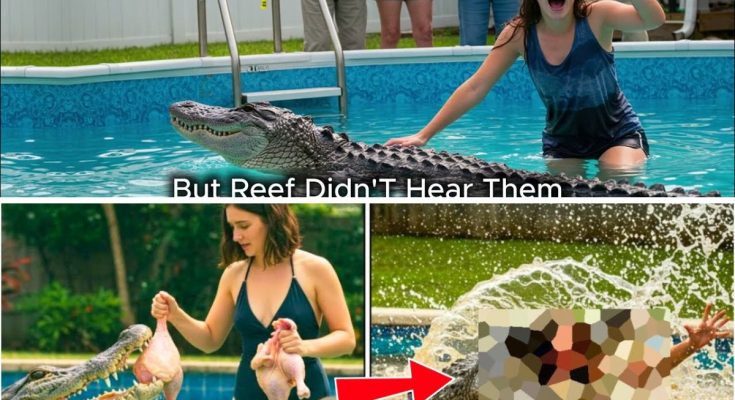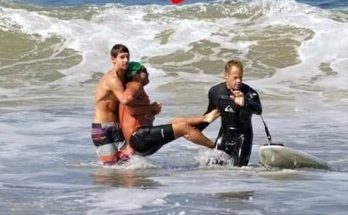Julia Banks’ Terrifying Last Swim – Her Pet Alligator Dragged Her Down: A True Story That Will Haunt You
In the quiet, sun-drenched suburbs of Florida, where palm trees sway gently in the breeze and waterways weave through backyards, a tragedy unfolded that would shock the nation. Julia Banks, a 28-year-old woman with a deep affinity for animals, met a horrifying end in July 2023, when her pet alligator, a creature she had raised and trusted, turned on her during what would become her final swim. This true story, steeped in both fascination and terror, serves as a chilling reminder of the unpredictable nature of wild animals, no matter how close a bond humans may believe they share with them.
Julia Banks was not your typical pet owner. Known in her community for her love of exotic animals, she had always been drawn to creatures that others might shy away from. Her home was a sanctuary of sorts, filled with reptiles, birds, and even a few small mammals. Among her collection was a 7-foot alligator she had named Brutus, a creature she had cared for since it was a hatchling. To Julia, Brutus was more than a pet; he was a companion, a testament to her belief that even the most feared animals could be tamed with love and patience. She would often share stories of their bond on social media, posting videos of herself feeding Brutus or swimming alongside him in the small, man-made pond behind her home. Her followers were captivated by her bravery and dedication, but some voiced concerns about the risks of keeping such a dangerous animal so close.
On that fateful July morning, the Florida sun beat down relentlessly, and Julia decided to cool off with a swim in her backyard pond. It was a routine she had followed countless times before, often with Brutus nearby, basking on the bank or gliding lazily through the water. Neighbors later recounted that Julia had a unique confidence around the alligator, treating him almost like a dog or a cat. She would call his name, and he would sometimes respond by approaching her, his powerful tail swaying gently. To an outsider, it might have seemed like a scene of harmony between human and beast, but beneath the surface, the instincts of a wild predator lay dormant, waiting for a trigger no one could predict.
That morning, something was different. According to reports, Julia entered the pond as she always did, her movements calm and familiar. Brutus was already in the water, his eyes just above the surface, watching her. What happened next unfolded with terrifying speed. Without warning, Brutus lunged, his powerful jaws clamping down on Julia’s leg. Her screams pierced the quiet morning, alerting neighbors who rushed to the scene. But it was too late. The alligator dragged her under, thrashing violently as it pulled her deeper into the pond. By the time authorities arrived, Julia’s lifeless body was recovered, her dream of coexisting with a wild creature shattered in the most brutal way possible.
The aftermath of the tragedy sent shockwaves through the community and beyond. News outlets picked up the story, and social media buzzed with a mix of horror, sympathy, and debate. Many questioned why Julia had been allowed to keep an alligator as a pet in the first place. In Florida, owning an alligator requires a permit, and Julia had complied with all legal requirements, but critics argued that the regulations were too lax. Others pointed out the inherent dangers of anthropomorphizing wild animals, no matter how much care and affection they are given. Alligators, after all, are not domesticated creatures; their instincts are hardwired for survival, not companionship. Brutus, who was later euthanized by wildlife officials, became a symbol of the fine line between fascination and danger.

The story of Julia Banks’ final swim is not just a tale of personal tragedy but a broader cautionary narrative. It raises questions about humanity’s relationship with nature and the allure of keeping exotic animals as pets. Julia’s love for Brutus was genuine, but it was built on a misunderstanding of the animal’s true nature. Experts in alligator behavior noted that even well-fed alligators can act on instinct, especially in environments like water, where they feel most in control. The pond, though small, was Brutus’ domain, and Julia’s presence may have triggered a territorial or predatory response. Some speculated that environmental factors, like the heat or changes in the alligator’s health, could have played a role, but the truth remains elusive.

For those who followed Julia’s story online, the tragedy was particularly jarring. Her posts had painted a picture of a woman who had forged a unique connection with a creature most would fear. Her confidence and warmth had inspired some to see alligators in a new light, but her death underscored the harsh reality that wild animals are not pets in the traditional sense. They do not form bonds the way dogs or cats do, and their actions are governed by instincts humans can never fully predict or control. Julia’s story became a viral cautionary tale, with YouTube videos and documentaries recounting the horrifying details, each adding to the growing lore around her life and death.
As the sun sets over Florida’s waterways, the memory of Julia Banks lingers like a shadow. Her story is a haunting reminder of the delicate balance between admiration for nature and the respect it demands. For every person who marvels at the power and beauty of an alligator, there is a lesson in Julia’s fate: love and trust cannot rewrite the instincts of a predator. Her final swim, meant to be a moment of connection with her beloved pet, became a tragedy that will echo for years to come, a story that will chill the hearts of those who hear it and forever change the way we view the line between human and wild.



